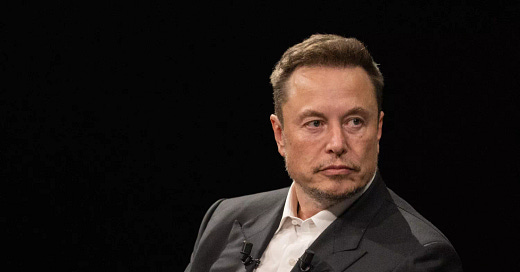Elon Musk, Asperger's, and Me
During his appearance in Saturday Night Live, Elon Musk declares: “I’m actually making history tonight as the first person with Asperger’s to host SNL… or the first to admit it.” Laughter ensues. In the previous line, he says that he routinely has to clarify his intentionality because: “I don’t always have a lot of intonation or variation in how I speak… which I’m told makes for great comedy.” By being honest about his challenges, Musk wins my undying admiration. As someone who lives with Asperger’s Syndrome - a milder form of autism - I understand what it is like to be misunderstood and mischaracterized, even after I have stated my intentions clearly. This is because in addition to speech, humans typically communicate via non-verbal gestures such as facial expressions, eye contact and speech intonations. Having Asperger’s, however, means having a marked difficulty in perceiving such non-verbal expressions, as well as a lack of ability to express them yourself. “I would just tend to take things very literally … but then that turned out to be wrong” recounted Elon in a TED conference. “[people were not] simply saying exactly what they mean, there's all sorts of other things that are meant, and [it] took me a while to figure that out.” The variety of social errors resulting from this difficulty may result in unique comedic situations, but in the day-to-day setting, it often results in loss of friendships, struggles in finding romantic love, and overall miscommunication among family members.
Which brings me to a recent piece in the Washington Post, where columnist Max Boot pens a hackneyed hit-job against the Tesla CEO. Boot, a military historian of much renown, has spent much of his allotted ink in the Post attacking Donald Trump, the MAGA movement, and their fellow travelers. It seems that he has set his next target to be Elon Musk, whom he characterizes as a ‘MAGA Megaphone’:
Musk needs to decide whether he wants to be the next Donald Trump Jr. (i.e., a major MAGA influencer) or the next James D. Taiclet (the little-known CEO of Lockheed Martin, the country’s largest defense contractor). Currently, Musk is trying to do both, and that’s not sustainable. He is presiding over a fire hose of falsehoods on X about familiar right-wing targets, from undocumented immigrants to “the woke mind virus” to President Biden … while reaping billions from Biden’s administration!
Setting aside Boot’s knee-jerk disgust at anything remotely connected to America’s previous President, his characterization of Musk is just the latest in a deluge of character assassinations and mischaracterizing of the Twitter Chairman’s intentions. Having bought Twitter and rebranded it as X, Musk has courted tremendous amount of controversy over his presence on the platform. Boot, for example, accused Musk of promoting antisemitism on Twitter, based on his X response to a dubious user promoting noxious anti-Jewish conspiracy theories:
An X user accused “Jewish communities” of promoting “hatred against whites” and added gleefully that “western Jewish populations” were “coming to the disturbing realization that those hordes of minorities … flooding their country don’t exactly like them too much.” Musk’s response: “You have said the actual truth.”
But this characterization completely neglects the fact that Musk, a self-proclaimed ‘free-speech absolutist’, banned Kanye West from X based on the latter’s unrepentant antisemitism. Despite his tendencies to provoke, Musk understands that there are certain lines you do not cross.

Which brings me to the shared problem that Musk, myself, and the population of people having Asperger’s have to face: we are not used to having a personal filter based on others’ response. Larry David brilliantly makes fun of this in an episode of Curb Your Enthusiasm:
Aside from the fact that many of those who live with Asperger’s either never receive a formal diagnosis, or only do so during their adult lives, the typical experience of someone with Asperger’s is that they have to be honest about what they truly think and feel, but are punished in the social setting for doing just that. As exhibited by Musk’s sharing of a political cartoon by biologist Colin Wright, he feels frustrated at the fact that while his views remain unchanged, the world around him has morphed and shifted to the point of unrecognizability and even overt hostility:
In my view, Musk’s troublesome purchase and ownership of Twitter is not a pure business consideration - he was hoping to restore an environment where he and other opinionated explorers of ideas can feel same expressing their honest views. The rise of political correctness and woke ‘progressivism’, for Musk, forecasts a dangerous climate where people keep silent or lie about their views in order to be socially acceptable. Any advocate of freedom of speech can agree that the permission of noxious actors to express their views, however dangerous, is a cost one has to pay in order to foster a climate where no one is afraid of saying what they truly think. In this vein, Musk finds good company in the equally brilliant and provocative journalist H.L. Mencken, who says that: “the trouble with fighting for human freedom is that one spends most of one’s time defending scoundrels. For it is against scoundrels that oppressive laws are first aimed, and oppression must be stopped at the beginning if it is to be stopped at all.”
Elon Musk’s greatest gifts, as well as his biggest difficulties, originate from the same fountain - Asperger’s syndrome and his life-long struggles with it. Any assessment of his achievements and mistakes must begin from this point.





